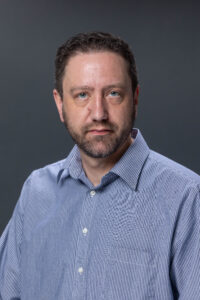Rx via drone
UND, the Three Affiliated Tribes and others test idea of delivering medications via drone

After a pair of recent drone test flights, UND and its tribal and industry partners are one step closer to achieving medical support for rural Indigenous communities in North Dakota.
The project, called MHA Nation Drones, took place in July and is part of an ongoing collaboration between the Mandan, Hidatsa and Arikara Nation, UND, multi-national pharmaceutical company Merck, and the Northern Plains UAS Test Site. The MHA Nation Drones project aims to support the prompt delivery of medicines and blood samples between the rural Indigenous communities of Twin Buttes, N.D. and New Town, N.D., where Elbowoods Memorial Health Center is located. Traveling between the two communities necessitates a 98-mile drive on two-lane highways, frequently in adverse weather conditions.
The collaborative event saw two successful test flights, including one at the Diabetes Education Center in New Town on July 12, and another at the Wellness Center in Twin Buttes the following day. The tests demonstrated the execution of loading and unloading medication, and the departure and landing portions of flights that support medical deliveries. UND Professor Mark Askelson, a meteorologist, provided long and short-range weather forecasts to ensure the capacity to fly.
The preliminary flights have laid the groundwork for further collaborative efforts with the goal of delivering medications and blood samples in a more direct and time-saving manner: across portions of the Missouri River.
Said Thomasine Heitkamp, project organizer, and behavioral health research specialist with the Division of Research and Economic Development at UND: “The generosity of the people of the MHA Nation, who hosted project staff during the test, was extraordinary in offering their time and expertise. I hope this is the beginning of many collaborative projects between rural health and autonomous systems that include the community with all efforts in place to support respectful partnership.”
The need for more direct delivery of medications
In the 1950’s, construction of the Garrison Dam by the Federal government resulted in the flooding of tribal lands. The MHA Nation is located on both sides of the Missouri river (Lake Sakakawea) in McLean, Mountrail, Dunn, Mercer, and Ward Counties, in the western part of North Dakota. The Nation encompasses 988,000 acres, with nearly half of that being owned by Native Americans.
The flooding created dramatic changes to the geography, landscape, and resource base of that region, and presents difficulties for travel to and from medical facilities. A one-mile-long bridge connects six segments of this Tribal Nation which results in the need for extensive travel to ensure access to a host of resources, including healthcare. Access to health care is especially difficult in tribal communities, but even more difficult with the complication of only one bridge connecting the rural areas of the Nation.
Elbowoods Memorial Health Center (EMHC), the clinic of the MHA Nation, offers a full-service clinic in New Town as well as field clinics in the White Shield, Parshall, Mandaree, and Twin Buttes segments of the reservation. EMHC and field clinics serve the preventative and therapeutic health needs of the communities.
EMHC and the Tribes’ Health Administration department worked collaboratively to coordinate and advance the drone delivery project. The project was made possible by the support of the MHA Nation Tribal Business Council.
“The drone delivery project was a great opportunity,” said Jared Eagle, tribal health administrator for the MHA Nation. “The two test flights were the first steps in using drone technology to be able to decrease transit time between our clinics to improve healthcare access. We are looking forward to the next steps and to where this project may lead in the future.”
Prior to the test flights, a community event was hosted on July 11 in collaboration with Nueta, Hidatsa Sahnish Tribal College, located in New Town. The event began with a prayer and introduction of need from Charlie Moran, Hidatsa language and custom traditions educator.

Representatives from UND and Merck showcased materials and visited with local youth and community members. UND staff helped young people practice flying a small drone, before playing games and serving up ice cream. The focus was on educating the public on the capability of drones and supporting the community. Following that, members held a picnic and many from EMHC were able learn about the drone used in the test flights.
A tour of the MHA Nation Interpretive Center was offered the following day by UND graduate Dr. Monica Mayer, MHA Nation Tribal Councilwoman. Mayer spoke of the history of MHA Nation and described the importance of addressing health disparities.
UND Grand Challenges
One of the aims of this project is to connect the UND Autonomous Systems and the Rural Health and Communities Grand Challenges areas. UND and Merck provided expertise and critical resources to begin this effort. With the goal of improving access to health care, using drones ensures the use of technology for a beneficial reason. This is the first step with continued collaboration with the Northern Plains UAS Test Site.
“I am thankful for the tremendous partnership of all of those who participated in this test, especially for the MHA Nation and their tremendous hospitality,” said Askelson. “I was fortunate enough to combine two of my passions, meteorology and autonomous systems/uncrewed aircraft, as part of this event.”




